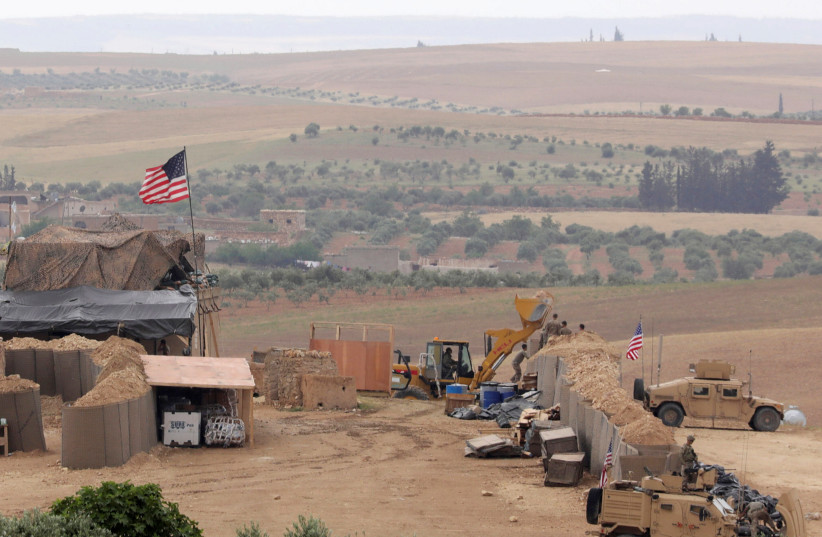Integration of regional air and missile defense, the use of a new drone task force, dealing with Russia’s “behavior” and deterring Iran are all key goals for the US Air Force and US Central Command these days in the Middle East.
The United States is continuing to work in the region to deal with challenges, such as Russia’s actions in Syria and to deter Iranian threats. United States Air Force Lt.-Gen. Alexus Grynkewich, commander of the Ninth Air Force and the Combined Forces Air Component Commander for US Central Command, gave a briefing Wednesday about some of the current actions the US is taking in this respect.
On the one hand, he addressed air operations in the Middle East and coordination to advance peace and stability in the region. He also focused on Russian aggression in Syria and the continuing war against ISIS.
The US has been in the Middle East for decades but its role is often shifting. Recently there has been “unprofessional” behavior by Russia in Syria as well as Iranian threats against US forces. Iran’s proxies use rockets and drones and recent reports suggest they will shift to using explosive devices.
Grynkewich said that Russia has been ignoring deconfliction protocols that Russia previously observed in Syria. These protocols go back to 2019. However, recently Russia hasn’t been informing the US when it flies into airspace long recognized as being used by the US-led Coalition in Syria. Grynkewich said that even on the morning of Tuesday and Wednesday, there were incidents of Russian activity. Sometimes these incidents may occur 3-4 times a day. Russian planes also apparently fly into areas where US forces are garrisoned and the planes are armed with bombs.

To address this behavior, the US deployed F-22s to the region. “This is part of a multi-faceted US show of support and capability in the wake of unsafe and unprofessional Russian behavior,” said Grynkewich. The F-22 is the most advanced air superiority fighter in the world, he noted. As Russia increased its actions it was necessary for the US to change its stance and take defensive measures, he noted.
The US general also pointed to the deployment of a bomber task force on June 8 to the region. This included work with partners in the region, such as Israel. It also shows how the US is committed to the region, he said. America can bring “overwhelming combat power at moment’s notice.” The US also used GBU-38s and AMG munitions in recent drills. It shows America’s “enduring commitment,” the officer said.
Task Force 99: American's Middle East drone investment
Another part of America’s role is Task Force 99, a unit in Air Forces Central Command that works with unmanned aerial assets, such as drones. This is important because the US Navy also has Task Force 59 in the Gulf working with unmanned vessels. This is part of America’s new investment in drone power in the region.
The commander said five countries are now part of Task Force 99 based in Al Udaid in Qatar. It has a “growing fleet of unmanned aerial vehicles…we look forward to using those in missions in region to find difficult targets, in the fight against ISIS or other purposes, we use the fleet of UAVs to increase awareness of air domain and impose dilemmas,” he said.
The US commander also addressed the need to deter Iran. He pointed out that Iran is selling drones to Russia and that Iran feels Russia now owes Iran something. “My sense is that Iran feels Russia owes it something. Iranians want the Coalition to depart Syria to have Iranian-aligned groups move advanced conventional weapons,” he said. This could threaten Israel and others.
“To me, a growing relationship with Iran and Russia will have a big impact on how Iran moderates or does not moderate its role in Syria,” he said. Iran fuels and foments instability in the region. The general also supported Israel’s right to act in its defense.
Of great importance he stressed the importance of the integration of regional air and missile defense, combining US and European capabilities “and robust capabilities nations in the region have,” he said. He discussed the need to “bring those together for a common operating picture is essential and key task…this comes down to radars and communication systems, and willingness among allies and partners to share intelligence, the more we can stitch together regional constructs the more stable it will be.”
He also noted the threat that the drug trade in captagon poses to the region. “This is primarily not a military mission, there are a number of agencies that work with neighboring countries to robust up defensive measures to secure borders and stop the flow of drugs,” he said.
